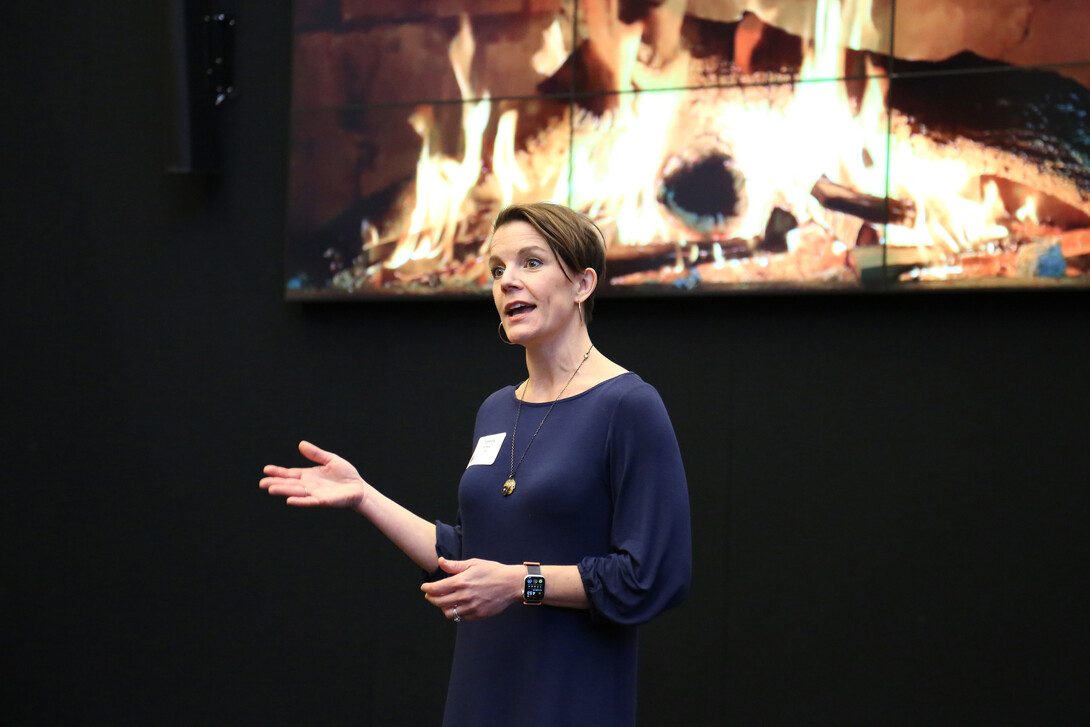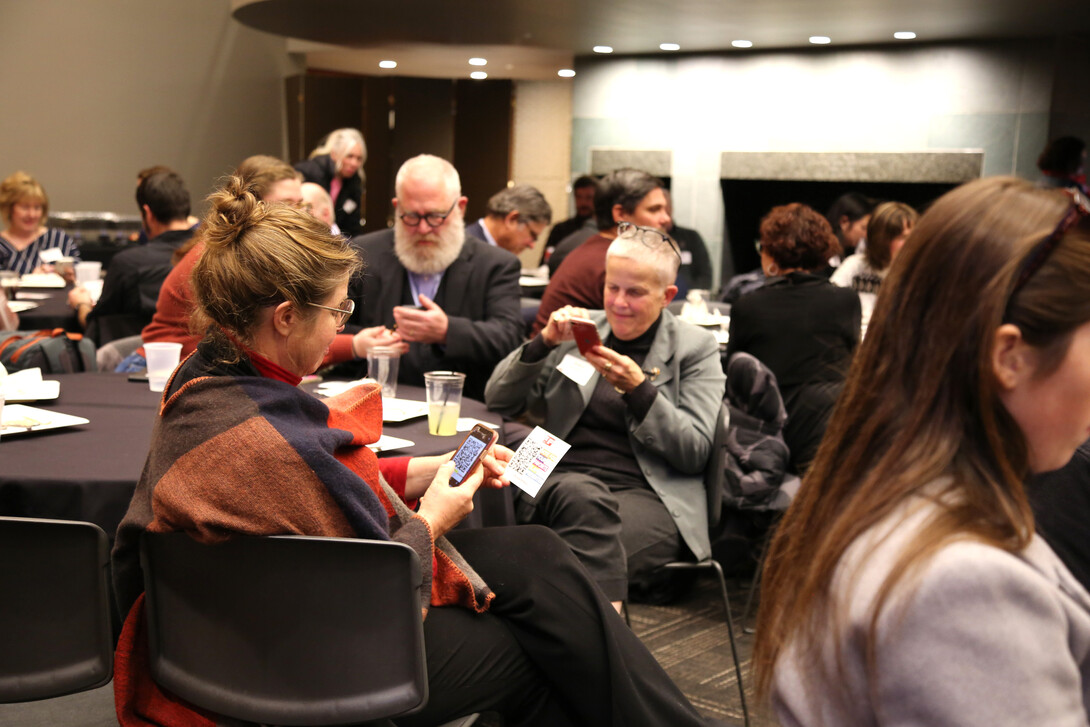
The value of a voice in combating loneliness — even if it’s not from a human. Rekindling a child’s wonder at science as adults. Helping professors and industry be more inclusive of marginalized students and workers. Tracking how breast milk delivers critical messages to infants’ organs. And helping scientists translate their work for others.
The 2022 Faculty Research and Creative Activity Slam, part of Nebraska Research Days, covered lots of ground Tuesday in its series of engaging five-minute, no-PowerPoint-allowed talks.
Valerie Jones, Seaton Distinguished Professor of advertising and public relations, was voted the winner by attendees, earning a $1,000 prize to go toward her research.
In her talk, “The Loneliness Epidemic and the Value of Voice,” Jones discussed her research into how voice can alleviate loneliness. She gave Amazon Echo devices — voice-activated virtual assistants — to people ages 72-92, and trained them to use them.
“Setting timers for cooking, or reminders for medication. Asking for the weather, or for the Husker game time. Playing music from their past that they used to dance to with their late spouse,” Jones said.
She found people were able and eager to engage with Alexa and even to use the technology to deepen existing relationships, including Walter, an unmarried, childless elderly man who called his niece with the assistant.
“She picked up through the app on her phone, and Walter was amazed — he saw blue skies, golden fields and his niece in her combine, right in the middle of harvest. I’ll never forget the look on Walter’s face as he took it all in, or the smile on hers as she showed him around the cab,” Jones said.
“What if … we prescribe interaction, social connection, and not just medication? If we create programs tailored to the individual, and proactively engage older adults when they need a companion most?”
Finding links between milk exomes and male reproduction
Amy Desaulniers, assistant professor of veterinary medicine and biomedical sciences, discussed “The Secret Messengers of Milk” in a talk that encompassed her experience nurturing a premature son and her research into the benefits of breast milk.
At Nebraska, she said, research has found that exosomes in pigs’ milk deliver health benefits from mother to piglet by carrying messages from one cell to another.
Human breast milk delivers benefits to infants, too. Desaulniers, a reproductive physiologist, has studied the biology of male reproduction. Breast milk consumption appears to improve sperm production capacity later in life. This research may result in development of milk exosome supplements for infants without access to mother’s milk, as well as novel methods to better preserve exosomes in donor milk for NICU babies like Desaulniers’.
“Now Benjamin is a happy, healthy 3-year-old, who one day may give us grandkids thanks to the superpowers of mother’s milk,” Desaulniers said.
Rediscovering the magic of science
Shireen Adenwalla, professor, and Xiaoshan Xu, associate professor, physics and astronomy, pitched their Funsize Physics website, which aims to recapture for people of all ages the childlike wonders of science. Xu recalled his introduction to science at age 8 when his older brother built a radio powered by electromagnetic waves, and Adenwalla reflected on her childhood dreams of walking on the moon.
“The wonder of science in childhood, whether you go on to be a scientist or not, shapes us,” Xu said. “The magic of science to a child is powerful. We all have experiences of nature and science that cause us to see the world differently.”
“Children explore the world through experimentation – pushing food off their highchair, poking around in the dirt, tasting everything. Where does this sense of exploration go as they get older, and how can we keep it alive,” Adenwalla said.
Funsize Physics aims to encourage and nurture that interest in science — though, as their matching sweatshirts warned, it’s “not responsible for any minds blown.”

Improving diversity, equity and inclusion
In his talk, “Developing a Pipeline to Create a More Diverse and Well-Educated Professional Workforce,” Stuart Bernstein, associate professor, Durham School of Architectural Engineering and Construction, reflected on being made to feel, as a Jewish person, “like I didn’t belong” in his 25 years in construction before pursuing his bachelor’s degree.
“They would say, ‘Your people don’t like to work with their hands. They don’t like getting dirty,’” Bernstein recalled. “Even now I hear comments like, ‘What is a person like you doing living in Nebraska?’ Because of those years of implicit disrespect, I feel I have an obligation to make life more inclusive for others.”
Bernstein said he and his colleagues have discussed developing training programs for professors who want to become more inclusive, working with educators outside the university to learn how to make students feel more welcome and working with industry to help their organizations become more diverse and inclusive.
Translating science to the public
Stephen Lahey’s “Translating the Language of Science” made connections from his own recovery from a cerebral hemorrhage to the way humans translate, not just languages but ideas and actions.
“‘Translate’ means to carry across. You start thinking according to one pattern, and then rearrange the idea so it fits into another pattern,” he said.
The Cotner College Professor of classics and religious studies said scientists struggle to explain their work to lay audiences, a shortcoming recently evident in public misunderstanding and disinformation about COVID vaccines.
“If scientists hope to convey the extraordinary advances they have come upon, they must do more to translate their thinking than simply to describe it. One might as well summarize Hamlet’s soliloquy as ‘He’s pretty depressed.’”







